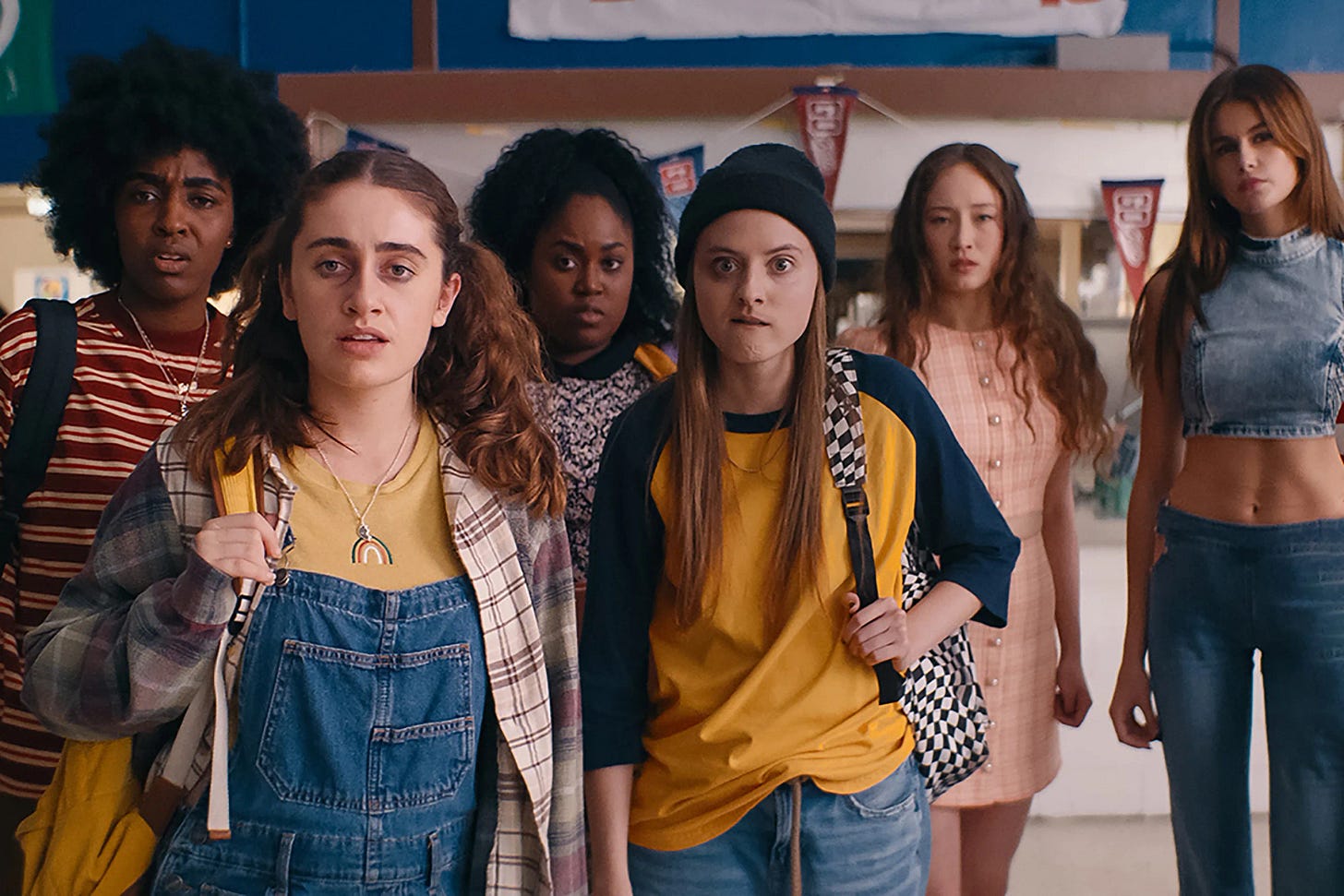What Teen Raunch Comedies Won't Say
Not even Bottoms.
Bottoms asks, would the raunchy teen comedies of the 80s and 90s be better if they were less racist and sexist and homophobic? And the answer is…kind of!
Emma Seligman’s film doesn’t exactly parody, reimagine, or break its genre apart the way that the classic and underappreciated But I’m a Cheerleader did back in 1999. Still, it’s hard not to be charmed by its unapologetic silliness even if its broad approach to its formula doesn’t leave a lot of room for character development or narrative surprise.
It's almost superfluous to describe the plot, which you already basically know going in if you’ve ever seen a movie—though, again, who gets to be the protagonist is pleasantly switched up. PJ (Rachel Sennott) and Josie (Ayo Edeberi) are lesbian social pariahs—or, as the film title says, bottoms. They’re also virgins and are determined to sleep with two conventionally attractive cheerleaders—Josie has her eye on Isabel (Havana Rose Liu) and PJ has hers on Brittany (Kaia Jordan Gerber).
In a desperate effort to have sex with, or just talk with, their respective crushes, PJ and Josie claim they spent a summer in a violent juvenile detention facility and start a women’s self-defense club; they promise to teach their peers to fight like hardened criminals. Improbably, and thanks to the help of their much more organized friend Hazel (Ruby Cruz), the club actually becomes popular, and Isabel and Brittany even join. But PJ and Josie still have barriers to overcome, such as Isabel’s self-absorbed, philandering, and flamboyant (but not gay) football boyfriend Jeff (Nicholas Galitzene) and the fact that Brittany is pretty sure she’s straight.
Again, you can guess most of the rest; there is bad language, uncomfortable rape jokes, ill-timed revelations which threaten to drive PJ and Josie (not to mention the objects of their affection) apart—and the big final fight set-piece with empowerment and romantic success for all!
The writing is witty and the leads are charming; it’s not a difficult watch unless embarrassment comedy makes you choke and cover your eyes (and I got through it even despite that.) The determined focus on the next gag, though, doesn’t give much space for us to learn about PJ and Josie, whose fake juvie ordeal is covered in a lot more depth than any aspect of their actual lives. Isabel and especially Brittney are even more shallow; they’re mostly there to be attractive and to be won or not won. There are a couple gestures at giving them an inner life; in a no doubt intentional meta moment, Brittney is upset that people just think of her as pretty and don’t even know she is smart and driven and has her own jewelry business.
If this was a straight comedy, turning the objects of affection into ciphers would be obviously sexist. But when the main characters are also women, it feels more like an affectionate nod to the tradition, the tropes of which can be indulged since they’re robbed of much of their queasy bigotry. The male gaze, like the cheerleader, is swiped from the men. You can see that as empowerment or as a snarky joke, either one.
The movie does toss a few ironic middle fingers in the direction of sexism; Mr. G. (Marshawn Lynch) switches from clueless dudebro to enthusiastic ally to men’s rights asshole with a self-absorbed indifference that seems pointed, as does Jeff’s utter assurance that he’s at the center of the universe. Homophobia is mostly sidestepped though; the film insists repeatedly that PJ and Josie are hated because they’re geeks, not because they’re gay, even as people write homophobic slurs on their lockers. Racism too is notable by its absence; the movie scrupulously avoids implying that Josie’s unpopularity has anything to do with racist animus.
Not every movie about marginalized people needs to be about discrimination. But it does feel a little strained when PJ and Josie are constant targets, but the movie isn’t interested in talking about the most plausible reasons for their harassment. Bottoms decision to excise its own core thematic material is maybe part of why it’s so chary about letting us get to know its characters. Everything needs to be at a distance, or the (enjoyably) silly film world will break apart, leaving something darker.
I’m not saying the film should be darker; it’s a fun frothy nothing, and that’s fine. It does suggest, though, that the teen raunch comedy, built on ubiquitous, ugly but ultimately harmless bullying and sexual objectification, can’t really function if you acknowledge real life bigotry and violence. Queering the tropes defuses some of the unpleasant implications. But if you fully explored what those teen films were saying, it would stop being funny.



Watched it this week & loved it.